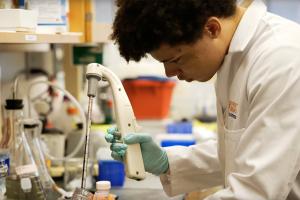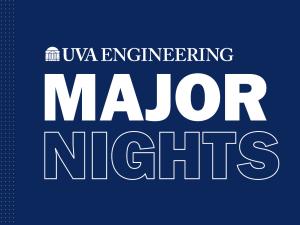Undergraduate Program
Biomedical engineers create new methods to explore life and treat disease. Students choose to become biomedical engineers because it is complex, challenging, and rewarding in ways that few fields can equal.

Biomedical engineers apply engineering, design and computational principles to medical and biological problems. They work to improve human health through the design, testing, and implementation of medical solutions. BMEs are responsible for technologies such as new generation imaging machines, advanced prosthetics, targeted pharmaceuticals, artificial and bio-artificial tissues and organs, and computational models of diseases, to name just a few.
Why choose UVA BME?
- An interdisciplinary curriculum that bridges engineering, design, computation/data science, and medicine.
- UVA BME, a joint department between the Schools of Engineering and Medicine, is one of only a few undergraduate programs to physically reside within the clinical spaces of UVA Health. This advantage gives our community excellent access to clinicians as collaborators.
- For more information on our curriculum, check out our B.S. Biomedical Engineering page.
- Meet some of our awesome faculty here.
- Excellent experiential learning opportunities
- Over 80% of UVA BME graduates have spent time doing undergraduate research as a student. Our students do research in BME labs, but also labs across Grounds, including in medical school departments, other engineering departments, and clinical research labs. For more information about undergraduate research at UVA BME, visit the Undergraduate Research page.
- Over 70% of UVA BME graduates have completed at least one internship as a student, and the BME department provides financial support as part of the Coulter Fellows program.
- An engaging, inclusive and collegial learning environment
- UVA BME students are highly engaged in their academic community, with over 75% participating in student organizations or clubs and about 50% serving in leadership roles.
- Outstanding career outcomes
- Over 80-90% of UVA BME graduates have secured their post-graduation position 3 weeks before graduation. For more information about our career outcomes, including the companies and institutions that accept or hire our graduates, please visit the Career Outcomes page.
- Connections to an engaged alumni network
- UVA BME has a large and engaged network of over 2300 alumni who love to support our undergraduate students. Students are given multiple opportunities to connect to these alumni, such as networking events and through the BME Connect Alumni Mentorship program.
- Meet some of our amazing alumni and hear about their career journeys here.
Our Undergraduate Programs
-
B.S. in Biomedical Engineering
Explore the BME bachelor of science curriculum and electives.
-
Biomedical Engineering Minor
The 18-credit BME Minor can be combined with any Engineering School or College of Arts and Sciences Major.
Resources for Current Students
-
Student Support
As an undergraduate student at UVA Engineering, you have access to an array of student support services including peer-to-peer tutoring, professional academic coaching, access to mental health support, and dedicated advising.
-
Academic Advising
Every student has an advisor in the Engineering School. While there are many resources for support at the University, we encourage students to advocate for themselves to the best of their ability and seek out support early and often.
-
Student Life
Discover more about student life at UVA and in Charlottesville.
Undergraduate Program Contacts

Shannon Barker, Ph.D.

Karen Sleezer
Quick Links
Accreditation
The UVA Biomedical Engineering undergraduate program is accredited by the Engineering Accreditation Commission of ABET, the national independent organization for accrediting academic programs in engineering and applied science. Our program is designed to meet ABET's requirements for program educational objectives and student outcomes. Program enrollment and graduation information is maintained by the UVA School of Engineering and Applied Science.
- Apply physical & life science, mathematical, computational and engineering foundations and integrate them toward biomedical engineering-specific applications.
- Define and perform the engineering design process within the biomedical engineering discipline.
- Define and perform fundamental steps in the research process.
- Make measurements on and interpret data from biological and biomedical systems.
- Develop strategies to continuously acquire contemporary concepts and skills.
- Function on a team where members together provide leadership, create a collaborative and inclusive environment, and effect goals, tasks, and objectives.
- Communicate science and engineering concepts and results to a variety of audiences.
- Demonstrate awareness and application of ethics, inclusivity, equity and empathy in biomedical research and design.
- Graduates draw upon their biomedical engineering foundations to perform experimental measurement, quantitative analysis, and engineering design.
- Graduates use tools and methods at the current state-of-the-art in biomedical engineering.
- Graduates apply problem solving abilities and multidisciplinary perspectives to understand and advance scientific discoveries and technological innovations.
- Graduates act to improve human health.
- Graduates exhibit intellectual curiosity, creativity, leadership and continuous personal growth.
Upcoming Events
See All News-
-
-
Time: 3:30 PM - 4:30 PMLocation: Olsson 001
The information contained on this website is for informational purposes only. The Undergraduate Record and Graduate Record represent the official repository for academic program requirements. These publications may be found here.

